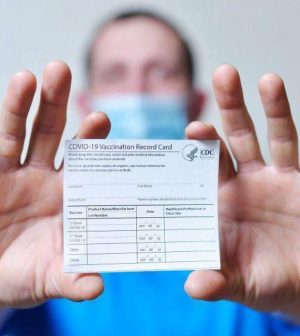- 10 Strategies to Overcome Insomnia
- Could Artificial Sweeteners Be Aging the Brain Faster?
- Techniques for Soothing Your Nervous System
- Does the Water in Your House Smell Funny? Here’s Why
- Can a Daily Dose of Apple Cider Vinegar Actually Aid Weight Loss?
- 6 Health Beverages That Can Actually Spike Your Blood Sugar
- Treatment Options for Social Anxiety Disorder
- Understanding the Connection Between Anxiety and Depression
- How Daily Prunes Can Influence Cholesterol and Inflammation
- When to Take B12 for Better Absorption and Energy
Vaccinated Have 1 in 13,000 Chance of Breakthrough Case Needing Hospitalization

With tens of millions of Americans now vaccinated against COVID-19 by the end of August, so-called “breakthrough” cases are bound to occur. But there’s reassuring news from new data: Most such cases are mild and those leading to hospitalization are exceedingly rare.
Overall, the latest data from the U.S. Centers for Disease Control and Prevention found that as of Aug. 30, there have been 12,908 cases of COVID-19 resulting in hospitalization or death among vaccinated Americans, CNN reported.
Considering that more than 173 million Americans had been vaccinated by Aug. 30, that works out to a one in 13,000 chance of a vaccinated person getting a case so severe that hospitalization is required, the news agency said.
Compare that to unvaccinated adults, whose risk of needing hospital care if they contract the new coronavirus is now 17 times that of their vaccinated peers, according to one study published last week in the online preprint journal medRxiv, which has not yet undergone peer review.
Fully vaccinated people now make up only 4% of cases of people hospitalized with COVID-19, CNN reported. Among these rare cases of vaccinated people getting a breakthrough illness that requires hospitalization, 70% occurred among adults aged 65 and older. For breakthrough cases resulting in death, 87% of patients were 65 or older.
The new CDC data is based on voluntary data from states and could be incomplete, but other studies are mirroring these trends. For example, in the medRxiv study looking at cases from Jan. 1 through June 30, 2021, the median patient age was 73 and about 71% had three or more underlying conditions, including diabetes, heart disease, autoimmune conditions and others.
In another study, this time conducted by Dr. Hyung Chun, associate professor of cardiology at Yale School of Medicine in New Haven, Conn., almost a thousand patients hospitalized for a variety of causes were tracked from the end of March through July of 2021, CNN reported. The study found that the median age of those hospitalized with severe COVID-19 symptoms was 80, more than half were overweight and most had underlying conditions such as heart disease, lung disease or diabetes.
In the same study, half of the hospitalized patients who tested positive for the new coronavirus had no symptoms — they were being treated for some other condition.
“It’s clear that the vaccines are highly effective, and without them we would be facing a much deadlier pandemic,” Chun told CNN. “As effective as the vaccines are, with emerging variants and increasing cases of breakthrough infections, we need to continue to be vigilant in taking measures such as indoor masking and social distancing.”
When it comes to giving out COVID-19 booster shots, all of this suggests that any rollout should focus on older populations, one expert said.
“I think what’s happening is the vaccinations may be showing greater waning of immunity over time in those (high risk) populations and that may be the reason for it,” Dr. Peter Hotez, a vaccinologist at Baylor College of Medicine in Houston, told CNN. “That’s why, for instance, Israel, when they first announced their booster plan to give a third immunization, they focused more on older individuals.”
More information
Find out more about COVID-19 vaccination at the CDC.
SOURCE: CNN
Source: HealthDay
Copyright © 2026 HealthDay. All rights reserved.










